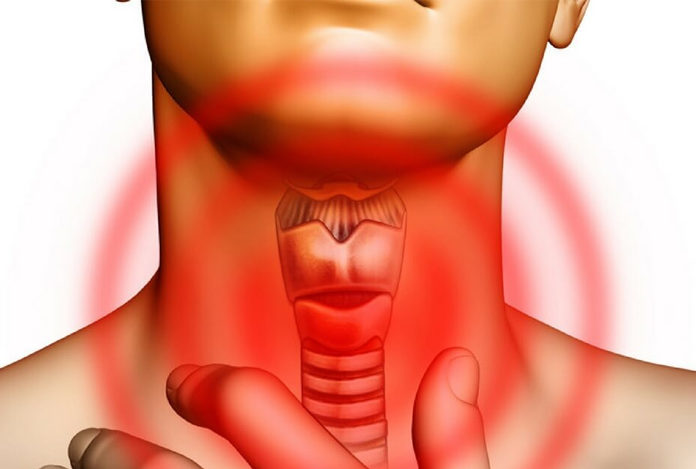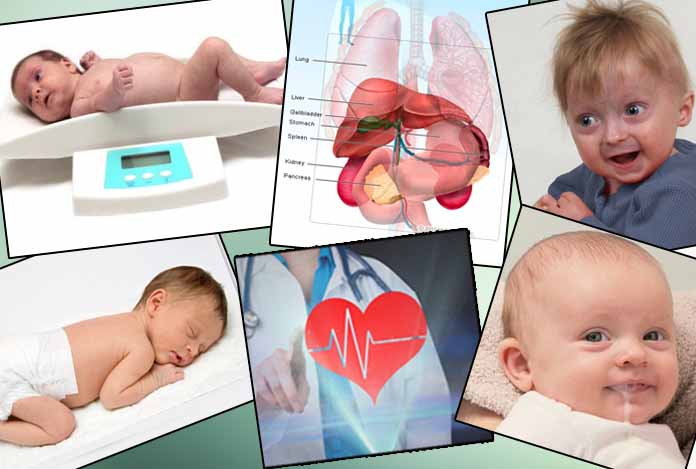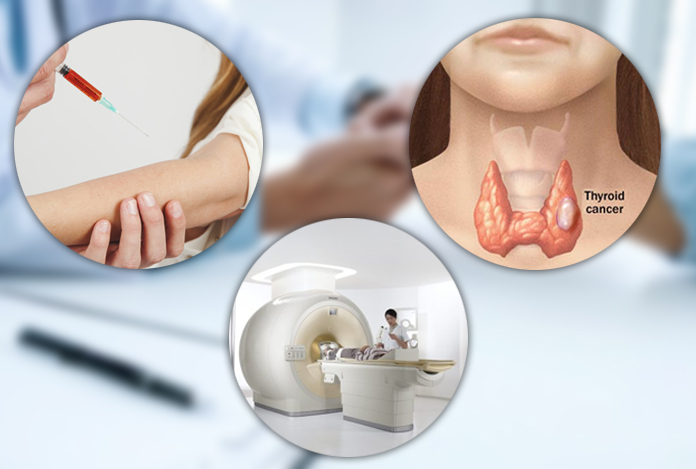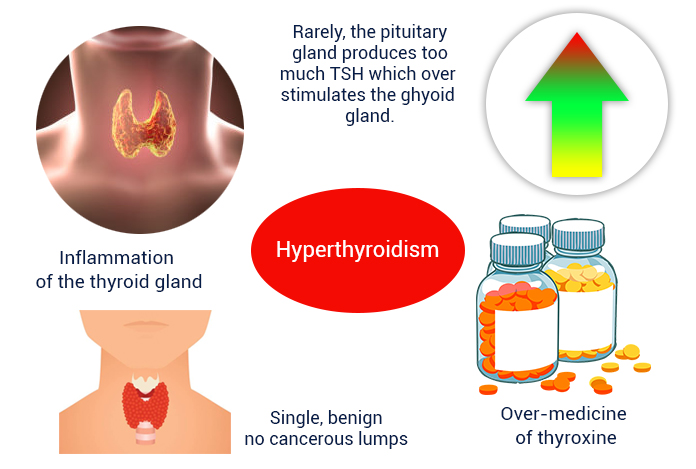
Overview
Thyroid gland is a butterfly-shaped gland situated near the base of the neck. It has two lobes, one on each side of the wind pipe. It is an endocrine gland responsible for secreting regulatory hormones, T3 and T4 into the bloodstream. These hormones control many vital metabolic processes as well as heart rate, blood pressure, body temperature and weight.
The levels of these hormones can increase or decrease in diseased conditions leading to hyperthyroidism or hypothyroidism, respectively. Hypothyroidism occurs when the thyroid gland produces insufficient thyroid hormones and hyperthyroidism is a condition in which the thyroid gland produces excess of thyroid hormones. Increased level of thyroid hormones is responsible for causing unpleasant and potentially serious problems requiring medical care. These hormones accelerate body’s metabolism significantly and cause sudden weight loss, a rapid or irregular heartbeat, nervousness, sweating and irritability. Hyperthyroidism leads to thyrotoxicosis is a situation in which there are high levels of thyroid hormones in the blood, irrespective of the reason.
Hyperthyroidism affects 0.1% to 0.5% people in the US, with women being more susceptible to develop the disease than men. It is estimated that more than 12 percent of the US population will develop a thyroid condition in their life. About 20 million Americans have some or the other form of thyroid disease, out of which about 60% are unaware of their condition. Pregnant women with undiagnosed thyroid condition carry high chances of having a miscarriage.
The American Thyroid Association recommends mandatory screening of newborns for any congenital defects in thyroid gland so that through early detection and treatment mental retardation can be reduced.
Types and Symptoms of Hyperthyroidism
There are a number of types of hyperthyroidism. They all differ in their causes and characteristic symptoms. Some of the common symptoms of hyperthyroidism are:
- Appetite change
- Fine tremor, with rapid vibrations
- Fatigue
- Heat intolerance
- Muscle weakness
- Nervousness
- Increased sweating
- Heart palpitations
- Hair thinning
- Increase in blood sugar

Types of Hyperthyroidism:
- Sub-acute thyroiditis-related hyperthyroidism
- Graves’ disease
- Chronic lymphocytic thyroiditis-related hyperthyroidism
- Iodine-induced hyperthyroidism
- Exogenous thyroid hormone ingestion-induced hyperthyroidism
- McCune Albright syndrome-related hyperthyroidism
- Viral thyroiditis-related hyperthyroidism
- Pituitary adenoma-related hyperthyroidism
- Childhood Grave’s disease
- Neonatal Grave’s disease
- Plummer disease-related hyperthyroidism
- Human chorionic gonadotropin secreting tumor-induced hyperthyroidism
- Postpartum hyperthyroidism
- Thyroid storm
1. Sub-Acute Thyroiditis-Related Hyperthyroidism:
It is an immune reaction of the thyroid gland, following an upper respiratory infection. It is a condition caused by viral infection of the ear, sinus or throat like mumps, flu or common cold. This follows a triphasic clinical course of hypothyroidism, hyperthyroidism and then back to normal thyroid function. There is no specific treatment for this disease.
Symptoms are:
- Weight loss even with increased appetite
- Atrial fibrillation marked by rapid heart palpitations, fatigue etc.
- Fine tremors
- Muscle weakness

2. Graves’ Disease
It is an immune system disorder causing excess production of thyroid hormones that affects a number of different body systems. It is most common among women less than 40 years of age. The exact cause of this type of hyperthyroidism is still unknown.
Symptoms are:
- Anxiety and irritability
- Fine tremors
- Heat sensitivity with increased perspiration
- Weight loss despite normal appetite
- Altered menstrual cycle
- Erectile dysfunction in males
- Bulging eyes, known as Graves’ ophthalmopathy
- Fatigue
- Thick red skin generally on the shins or tops of the feet, known as Graves’ dermopathy
- Rapid and irregular heartbeat

3. Chronic Lymphocytic Thyroiditis-Related Hyperthyroidism
Thyroiditis is the inflammation of the thyroid gland. Chronic lymphocytic thyroiditis is also known as Hashimoto’s thyroiditis. In this particular condition, thyroid gland is enlarged and the cells of thyroid become inefficient in converting iodine into thyroid hormones. Hence, the gland compensates it by enlarging itself. It generally affects middle-aged women but can also affect men, children and women of any age.
Symptoms are:
- Fatigue
- Increased sensitivity to cold
- Constipation
- Pale and dry skin
- Puffy face
- Brittle nails
- Hair loss
- Depression
- Joint pain and stiffness
- Muscle weakness
- Enlarged tongue
- Excessive menstrual bleeding

4. Iodine-Induced Hyperthyroidism
Iodine-induced hyperthyroidism, also known as Jod -Basedow phenomenon, is a condition which develops due to exposure to excessive iodine. Being exposed to drugs like Amiodarone and contrasting agents used for radiological imaging which contain iodine, increases the chances of getting Iodine-induced hyperthyroidism. Treatment is often challenging as the drugs which are generally used for treating hyperthyroidism have little effect on it. Generally, it is associated with some form of silent thyroid disease and presents itself after one or more contrast based radiological imagining. It can be missed in the elderly as it does not present itself with common features of hyperthyroidism.
Symptoms are:
- Weight loss
- Rapid heart rate, called tachycardia

5. Exogenous Thyroid Hormone Ingestion-Induced Hyperthyroidism
This occurs due to ingestion of excessive amounts of thyroid hormone, which might be intentional or inadvertent. Excessive amounts of thyroid hormones can be prescribed while treating thyroid cancer or it can be ingested unknowingly through contaminated dietary supplements. Symptoms occur at doses in excess of 200 mcg for T4 hormone, 50 mcg for T3 hormone, 120 mcg for desiccated thyroid and 37.5 mcg T3/150 mcg T4 for liotrix. It is common in patients suffering from thyroid cancer prescribed with low doses of thyroxine,

6. McCune Albright Syndrome-Related Hyperthyroidism
McCune Albright syndrome is a genetic disorder which is not inherited from the parents but occurs due to mutation in fertilized zygote. It affects bones, skin and endocrine system. In this disease, there is hyper-functioning endocrine gland and other serious features. It commonly involves thyroid gland, resulting in formation of nodules in the gland etc., leading to hyperthyroidism.
Symptoms are:
- Autonomously functioning thyroid gland
- Increased production of T3 hormone by the thyroid gland causing increased rate of
- metabolism
- Thyroid cancer in advanced cases
- Fragile bones

7. Viral Thyroiditis-Related Hyperthyroidism
Thyroiditis is a condition in which there is inflammation of thyroid gland. Thyroiditis occurring due to viral infection is called viral thyroiditis. Viral infections are the major environmental factor causing thyroiditis.
Symptoms are:
- Small goiter with tenderness
- Hyperthyroidism followed by hypothyroidism and again hyperthyroidism. The time span of each phase varies, each phase lasting generally for 2-3 months.
- Hyperthyroidism is accompanied by nervousness, tremor, palpitations, insomnia etc.
- Hypothyroidism is characterized by slowness, fatigue and feeling colder than usual.

8. Pituitary Adenoma-Related Hyperthyroidism
Abnormal growths occurring in the pituitary gland are known as pituitary tumors. stimulating hormone These tumors result in overproduction of TSH or Thyroid stimulating hormone, which causes the thyroid gland to produce thyroid hormones in excess, leading to hyperthyroidism. Pituitary tumor secreting TSH is called Thyrotropinoma or TSHoma.
Symptoms are:
- Nervousness
- Increased perspiration
- Palpitations
- Hand tremors
- Anxiety
- Insomnia
- Weight loss

9. Childhood Grave’s Disease
It is an immune system mediated disorder due to production of thyroid stimulating immunoglobins produced by stimulated B lymphocytes. These immunoglobins bind to TSH receptors present on the thyroid gland and mimic the action of TSH, causing the thyroid gland to increase in size and secrete excess of thyroid hormone.
Symptoms are:
- Enlarged thyroid gland
- Rapid heart rate
- Hyperthyroid stare
- Tremors
- Frequent bowel movement
- Low attention span
- Insomnia
10. Neonatal Grave’s Disease
In this disease, there is production of antibodies which attack the thyroid gland of the newborn baby and causes it to produce more of the thyroid hormones. It occurs in neonates whose mothers have or had Graves’ disease. Pregnant women having Graves’ disease carry a high risk of stillbirth, miscarriage or pre-term birth. Graves’ disease in neonates can be fatal.
Symptoms are:
- Low birth weight
- Small or abnormally shaped head
- Poor weight gain
- Enlarged liver and spleen
- Fast heartbeat
- Bulging eyes
- Vomiting
- Diarrhea
- Swelling of the front neck due to large thyroid

11. Plummer Disease-Related Hyperthyroidism
Plummer disease is also known as Toxic Multinodular Goiter and is characterized by enlarged thyroid gland, firm thyroid nodules and overproduction of thyroid hormones. In this condition, there are formations of solitary or multiple toxic nodules in the thyroid, which are cancerous in nature. It is more common in elderly.
Symptoms are:
- Weight loss
- Diarrhea
- Increased appetite
- Irritability
- Tiredness
- Palpitations
- Poor sleep
- Increased sweating
- Tremors
- Heat intolerance

12. Human Chorionic Gonadotropin Secreting Tumors-Induced Hyperthyroidism
Human chorionic gonadotropin (hCG) is a hormone produced by the placenta after implantation in the uterus. However, some cancerous tumors like those in testicular cancer, are known to produce this hormone. hCG is structurally similar to TSH and hence it stimulates the thyroid gland to produce more thyroid hormone, leading to hyperthyroidism. Such hyperthyroidism generally remains subclinical.
Symptoms are:
- Rapid weight loss, fatigue
- Irritability
- Heat sensitivity
- Diarrhea
- Tremors
- Irregular heartbeat, sweating, palpitations
- Thinning of skin

13. Postpartum Hyperthyroidism
It is a condition in which a previously normal functioning thyroid gland becomes inflamed within the first year of childbirth. It is a rather uncommon condition which lasts from several weeks to months. The symptoms often go undiagnosed as it is often attributed to tiredness and exhaustion due to having a baby and postpartum mood disorders. In some women, the situation reverses after 12-18 months while in some, permanent complications develop.
There are generally two phases associated with this disease. In the first phase, there is inflammation of thyroid gland and release of thyroid hormones causing mild signs and symptoms.
Symptoms are:
- Anxiety
- Irritability
- Rapid heartbeat or palpitations
- Unexplained weight loss
- Increased sensitivity to heat
- Fatigue
- Tremors
- Insomnia
These symptoms occur after 1to 4 months of the delivery and last for 1 to 3 months. After that, the thyroid cells become less active and symptoms of underactive thyroid gland develop such as:
- Lack of energy
- Increased sensitivity to cold
- Constipation
- Dry skin
- Difficulty concentrating
- Aches and pains
These signs occur 4 to 8 months after the delivery and last for 9 to 12 months.

14. Thyroid Storm
It arises due to untreated or undertreated hyperthyroidism. There is an excessive release of thyroid hormones which can cause life-threatening conditions. It is generally triggered after a stressful condition or a serious illness or surgery or using Iodine for a CT scan or in radioactive iodine therapy.
Symptoms are:
- Fever, above 40°C or 104°F.
- Tachycardia
- Hypertension
- Neurological and Digestive tract abnormalities
- Congestive heart failure along with hypotension and shock

Risk Factors of Hyperthyroidism
Following are the risk factors associated with hyperthyroidism:
1. Medical Conditions: Conditions like certain viral infections, pregnancy and a history of other autoimmune disorders like Rheumatoid arthritis, Diabetes type I, can increase a person’s risk of developing hyperthyroidism.
2. Age: It can happen at any age but is more common in people aged 60 years and above. Graves’ disease is more common in people aged between 40-60 years.
3. Gender: Women are more susceptible to developing this disease than men.
4. Genetic Factors: A person having a family history of hyperthyroidism is at a higher risk of developing the disease than those who are not predisposed genetically.
5. Ethnicity: People having Japanese ancestry are at a greater risk of developing hyperthyroidism due to high consumption of saltwater fishes which are a rich source of iodine.
6. Others: If an iodine deficient diet is consumed for a long time and then iodine supplements are taken, then this can increase the person’s risk of developing hyperthyroidism.

Do I Have Hyperthyroidism?
If you experience fatigue, depression, unexplained weight changes despite normal appetite and have difficulty in tolerating heat or cold, you might have hyperthyroidism. If you have palpitations, difficulty in sleeping and concentrating, unusual hair loss, dry hair, troubled bowel movement, swelling or protrusion in eyes, slight tremors in hands, then you must make it a point to see a medical practitioner. You might be suffering from hyperthyroidism which will be confirmed through various diagnostic tests. If you are a woman and experience any changes in your menstrual cycle or have been pregnant or miscarried in the past two years, then you must and observe any of the symptoms mentioned above, then you must see a doctor. If any of your family members has Graves’ disease or any other disease related to thyroid gland, then you must have regular checkup of your thyroid gland.

Causes and Prevention of Hyperthyroidism
There can be a number of reasons for development of hyperthyroidism, such as:
1. Graves’ Disease
In this, the thyroid gland loses the ability to respond to normal control by the pituitary gland through Thyroid Stimulating Hormone, TSH. This disease is thought to be an autoimmune disease as the antibodies characteristic of an autoimmune disease is found in the blood.
2. Functioning Adenoma and Toxic Multinodular Goiter
With advancing age, the thyroid gland becomes increasingly lumpy. These lumps do not produce any hormone and require no treatment. Occasionally, one of the nodules becomes autonomous and stops responding to TSH secreted by Pituitary gland. It starts producing thyroid hormones on its own. Such nodules which are more than 3cm in length are known as functioning nodules and can be detected through a thyroid scan.
3. Excessive Intake of Thyroid Hormones
Ingestion of excess of thyroid hormones for losing excess weight can result in development of hyperthyroidism. Such patients have a low uptake of radioactively labeled iodine which can be detected on a thyroid scan.
4. Abnormal Secretion of TSH
A tumor in the pituitary gland can result in abnormally high secretion of TSH leading to excessive signaling to thyroid gland for producing thyroid hormones. This is a rare condition and can be associated with other abnormalities of pituitary gland.
5. Excessive Iodine intake
Excessive intake of iodine can stimulate the thyroid gland to produce more thyroid hormones, leading to hyperthyroidism. Such condition is generally seen in patients having undiagnosed thyroid gland disorder. Certain medications such as amiodarone can also lead to hyperthyroidism in already abnormally functioning thyroid as it contains a large amount of iodine.
For preventing development of hyperthyroidism, following steps can be taken:
- Increased consumption of calcium and sodium.
- Proper intake of Vitamin D supplements to prevent osteoporosis.
- Non-consumption of medicines rich in thyroid hormones for weight reduction.
- Decreased intake of alcohol, caffeine and ceasing smoking.
Diagnosis and Tests of Hyperthyroidism
Hyperthyroidism can be diagnosed using the following techniques:
1. Medical History and Physical Examination
The healthcare providers look out for
- Slight tremors in the fingers of the patients when they are extended
- Overactive reflexes
- Eye changes
- Warm and moist skin
The thyroid gland is also examined as the patient swallows to check if it is enlarged, bumpy or tender along with the pulse rate.
2. Cholesterol and Triglyceride Test
The patient’s blood cholesterol levels are tested to determine whether the person has an elevated metabolic rate. In that case, the person has low cholesterol levels indicating that the body is utilizing cholesterol quickly. Similarly, low levels of triglycerides indicate high metabolic rate suggesting hyperthyroidism.
3. Blood Test
Levels of thyroxine and TSH in the blood are measured. High levels of thyroxine and low or nonexistent amounts of TSH suggest an overactive thyroid gland, resulting in hyperthyroidism. The levels of TSH is important because it is responsible for signaling thyroid gland for producing thyroid hormone. Such tests are important for diagnosing hyperthyroidism in adults in which the disease is generally silent.
When the blood test indicates hyperthyroidism, following tests are undertaken to determine the reason for thyroid gland’s overactivity:
a) Radio Iodine Uptake Test: This test is done to detect the cause of hyperthyroidism. Here a small amount of radioactive iodine is given orally whose concentration is determined in the thyroid gland after 2, 6 or 24 hours. A high concentration of iodine in the thyroid gland indicates overactivity of thyroid gland for which the most likely cause can be Graves’ Disease or hyper-functioning nodules. On the other hand, if the patient has hyperthyroidism and yet his radioactive iodine uptake is low, it indicates that the hormone is leaking into the bloodstream, leading to thyroiditis.
b) Thyroid Scan: During this procedure, a radioactive isotope is injected into the vein inside the patient’s elbow or hand. The patient is then made to lie flat on the table with his head stretched backward while a special camera is used to produce an image of the patient’s thyroid gland.
c) CT or MRI Scan: CT or MRI scan might be used to determine if the overactivity of thyroid gland is being caused by a tumor in the pituitary gland.

Treatment and Care of Hyperthyroidism
Treatment of Hyperthyroidism:
There are several approaches available for treating hyperthyroidism. The best treatment method is chosen by considering the patient’s physical condition, age, underlying cause and severity of the disorder. Following are the treatment methods available for hyperthyroidism:
a) Radioactive Iodine: Oral administration of radioactive iodine enables it to get absorbed by the thyroid gland and causes it to shrink. The symptoms subside gradually; usually within three to six months. It has been used for treating hyperthyroidism for more than 60 years and is generally considered safe.
b) Anti-Thyroid Medications: These are the medicines that are used to decrease the symptoms of hyperthyroidism by gradually preventing the thyroid gland from producing excess amounts of hormones. The medicines included in this category are:
- Propylthiouracil
- Methimazole
The symptoms start improving within 6 to 12 weeks, but these medicines require at least a year or longer to show their complete effect. Most of the people recover completely from hyperthyroidism after taking these medicines, but in some cases, symptoms might relapse.
c) Beta Blockers: These are generally prescribed for treating high blood pressure. They do not reduce thyroid hormone levels, but help reduce palpitations, rapid heart rate and other associated symptoms.
d) Surgery: Surgery is prescribed only when the patient is pregnant, unable to tolerate anti-thyroid drugs or cannot be prescribed with radioactive therapy. In this procedure, the surgeon removes most of the thyroid gland. After the surgery, the patient is prescribed a lifelong treatment with levothyroxine to maintain normal thyroid hormone level in the body.
e) Care for People with Hyperthyroidism: If the patient loses a lot of weight and muscle mass; extra calories and proteins must be included in his/her diet. Meal planning can be done after consulting with a doctor and dietitian. In most cases, these supplements are not required after the thyroid hormones reach normal levels in the blood. It should also be noted that treatment for hyperthyroidism eventually leads to excessive weight gain. Therefore, it is important to watch the calories being taken through diet. It is also important to consume right amounts of sodium and calcium through diet.
Hyperthyroidism also leads to thinning of bones. Therefore, it is important to supplement the patient’s diet with calcium and vitamin D to prevent osteoporosis.
Patients are advised to indulge in regular physical exercise to improve their muscle tone and cardiovascular system. It also helps in improving the energy levels in the body.
Relaxation techniques can also be employed by the patient to help him cope with the illness during the treatment. It can help the patient to maintain physical and mental wellbeing.

OTC or Self-Management Methods of Hyperthyroidism
In the US, there are two anti-hyperthyroidism drugs that are available as over-the-counter medicines, namely, propylthiouracil (PTU) and methimazole. They inhibit thyroid gland from producing T3 and T4 hormones. PTU carries a lower risk of developing birth defects and hence is used by pregnant women having hyperthyroidism.
People taking OTC medicines for managing hyperthyroidism are at a high risk of taking too much or too less of the thyroid hormone and both situations can cause serious health complications.
If the symptoms continue even after taking OTC medicines indicate that the condition is not being treated properly and hence require medical intervention. Some of the OTC medications can be dangerous as they may decrease the body’s ability to absorb prescribed hyperthyroidism medication.
Self-management of hyperthyroidism with any thyroid hormone replacement therapies is strongly discouraged by the medical professionals. Taking thyroid hormones without being monitored by any health care provider is extremely dangerous especially if there is hidden heart disease. The need of the hour is to educate people about the disease and the associated dangers.

Natural Ways To Cure Hyperthyroidism
There are a few natural methods that can be used for managing hyperthyroidism.
1. Bugleweed
Also known as Lycopusvirginica, this herb helps in reducing the numbers of thyroid hormones in the body. Studies have shown that the extract of this herb helps in reducing TSH levels, hence decreasing synthesis of thyroid hormone. Moreover, it also has detrimental effect on T4 and prevents its conversion to T3.
2. Lemon Balm
Lemon Balm which is known as Melissa officinalis, is a herb that helps in normalizing an overly active thyroid gland by decreasing TSH levels in the body. It is rich in flavonoids, phenolic acids etc. which regulate thyroid function. It also blocks the action of antibodies produced in the case of Graves’ disease.
3. Motherwort
This herb acts as a natural beta blocker and hence helps in controlling palpitations in the patients. It has certain anti thyroidal activity as well.
4. Omega 3 Fatty Acids
When there is a deficiency of omega 3 fatty acids, it indicated hormonal imbalance, including thyroid hormones. These fatty acids help in controlling immune function and cell growth and improve the body’s ability to respond to thyroid hormone. Omega 3 fatty acids can be obtained from fish, grass-fed animal products, flaxseeds and walnuts.
5. Broccoli
Broccoli contains isothiocyanates and goitrogens which help in preventing thyroid gland from producing excess hormones. People suffering from hyperthyroidism are hence encouraged to consume uncooked broccoli. Other vegetables that have similar properties as broccoli include cauliflower, turnips, kale, mustard greens and radishes.
6. Antioxidants and Proteins
Diet rich in antioxidants helps in managing thyroid hormone levels. This is due to the fact that antioxidants scavenge free radicals which cause hyperthyroidism. Foods like fresh fruits and berries which are high in antioxidants like Vitamin C, E, beta-carotene, selenium and magnesium are very beneficial. Other foods that can be included are lean meats, eggs, nut butter, seeds, yogurt etc. foods that should be avoided include red meat and processed meats.

Health Tip by Expert
In order to lead a healthy life with hyperthyroidism, it is necessary to take proper guidance from a medical practitioner and avoid self-diagnosis and self-treatment. Foods like broccoli, cauliflower and nuts, that help in managing hyperthyroidism should be included in diet religiously. Maintaining proper weight is also very important. To avoid developing the disease, stress, caffeine and smoking should be avoided.







